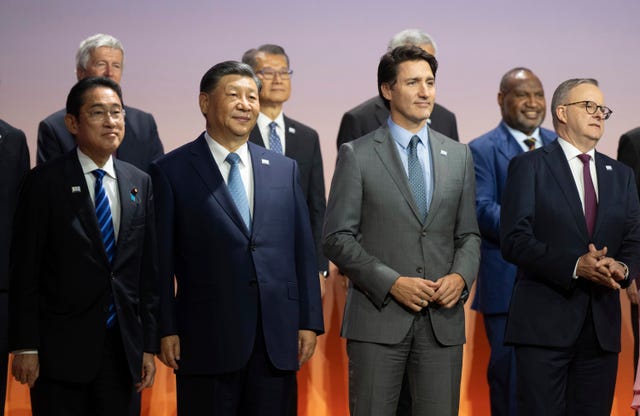
Australian Prime Minister Anthony Albanese has criticised China over a “dangerous” encounter between the two countries’ warships, but declined to say whether he had raised the issue in recent talks with President Xi Jinping.
Mr Albanese said an Australian diver was injured after a Chinese destroyer used sonar near an Australian frigate as it sailed in international waters last Tuesday.
Australian defence minister Richard Marles said he had raised serious concerns with Beijing about what the Prime Minister said was the destroyer’s “unsafe and unprofessional” behaviour.
Between the encounter and Mr Marles’ statement, Mr Albanese spoke to Mr Xi on the sidelines of an Asia-Pacific leaders’ summit in San Francisco.
Mr Albanese said on Monday his discussions with Mr Xi were private, rather than a formal bilateral meeting in which content summaries are made public.
“I don’t talk about private meetings on the sidelines, discussions I have with any world leader,” Mr Albanese told Sky News.
He added: “It’s something that is a regrettable incident. That’s why we have put our very strong objections to China very clearly, very directly through all of the appropriate channels in all the forums that are available to us.”
Because these partnerships are vital to Australian jobs and our economy. pic.twitter.com/1NTZ1H86V4
— Anthony Albanese (@AlboMP) November 18, 2023
Opposition figures have accused Mr Albanese of failing to raise the encounter with Mr Xi because the Australian leader did not want to risk setting back an improving bilateral relationship.
Deputy Liberal Party leader Sussan Ley posted on social media: “More weak leadership from Anthony Albanese who appears to be prioritizing photo ops with Xi Jinping over speaking up for our people. Disgraceful.”
Mr Albanese recently became the first Australian leader to visit China in seven years in a sign that relations have improved since Ms Ley’s coalition government was voted out of office in 2022 after nine years in power.
The US, Canadian and Australian militaries have complained multiple times about what they say have been dangerous actions by the Chinese navy and air force in the western Pacific.
Analysts fear a collision or other accident could spark an international incident and escalate into conflict.
‘Cooperate where we can, disagree where we must’ should never mean stage managing CCP aggression that injures our ADF personnel.
More weak leadership from Anthony Albanese who appears to be prioritising photo ops with Xi Jinping over speaking up for our people.
Disgraceful. pic.twitter.com/8iInb4shj1
— Sussan Ley (@sussanley) November 20, 2023
Australia said the Chinese destroyer Ningbo operated its sonar while Australian naval divers were underwater trying to clear fishing nets that tangled the propellers of their ship HMAS Toowoomba.
Mr Albanese said one diver was injured.
Defence officials have not specified the injuries or number of divers, but media have reported the divers’ ears were injured.
Analysts say sonar can cause extensive soft tissue damage to divers at close range.
Australia said the Toowoomba notified the Ningbo that diving operations were under way, and asked the Chinese to keep clear.
But the Ningbo approached using a hull-mounted sonar equipment, putting the divers at risk and forcing them from the water, defence officials said.
Chinese foreign ministry spokesperson Mao Ning said the nation’s military is always highly disciplined and conducts professional operations in accordance with international law and international practice.

Ms Mao told a regular media briefing on Monday: “We hope the relevant party will stop stirring up trouble at China’s doorstep and work with us to jointly sustain the momentum of the improvement and development of China-Australia relations.”
The Chinese Communist Party’s Global Times newspaper questioned the Australian version that the Toowoomba was in international waters within Japan’s exclusive economic zone when it encountered the Ningbo.
An unnamed military expert told the newspaper that if the Toowoomba had been near Chinese islands or a Chinese military training exercise, the Australian warship would have provoked the Chinese.
Mr Albanese said the incident “does do damage” to Australia’s relationship with China.
“This was dangerous, it was unsafe and unprofessional from the Chinese forces,” he said.


Comments: Our rules
We want our comments to be a lively and valuable part of our community - a place where readers can debate and engage with the most important local issues. The ability to comment on our stories is a privilege, not a right, however, and that privilege may be withdrawn if it is abused or misused.
Please report any comments that break our rules.
Read the rules hereLast Updated:
Report this comment Cancel